2016春科普版英语六下Lesson1I’mnotfeelingwellword教案
最新科普版英语六年级下册课文及翻译 (直接打印版)

最新科普版英语六年级下册课文及翻译 (直接打印版)Lesson 1 I’m not feeling well.Let’s talk(M=Mom, T= Tom)M: What,'s the matter, T om?T: I'm not feeling well, MomM: Do you have a cold?T: Yes, I think so. Could you give me some water, please?M: Here you are.T: Thank you, Mom.M: T om, you must go and see a doctor.T: OK, Mom.M: It's cold outside. You must wear your coat.T: OK, Mom. Could you pass me my coat,please?M: Here you are.T: Thank you, MomM: T ell me your teacher's number. I'll call him and tell him you are sick. T: OK. Here it is.译文(M=妈妈,T=汤姆)妈妈:怎么了,汤姆?汤姆:我感觉不舒服,妈妈。
妈妈:你感冒了吗?汤姆:是的,我想是这样的。
您能给我一些水吗?妈妈:给你。
汤姆:谢谢您,妈妈。
妈妈:汤姆,你必须去看医生.汤姆:好的,妈妈。
精选文库妈妈:外面很冷。
你必须穿你的外套。
汤姆:好的,妈妈。
您能把我的外套递给我吗?妈妈:给你。
汤姆:谢谢您,妈妈。
妈妈:告诉我你老师的电话号码。
我将给他打电话告诉他你生病了。
汤姆:好的。
电话号码在这儿。
ReadA good habitDan often stayed up late and got up late . At last he became ill. He had a bad headache, and couldn't get to sleep at night. So he went to see a doctor. “Oh, you look tired. What's the matter?" the doctor asked.“I have a bad headache and can't get to sleep at night.”Dan said.“When do you usually go to bed?”“I usually go to bed after 12 o'clock.”“You should go to bed before 10 o'clock. Drink some milk before you go to sleep. I’m sure you will sleep well and get better soon.”From then on, Dan went to bed early and soon he got better.It's a good habit to go to bed early and get up early.译文一个好习惯丹经常熬夜到很晚而且很晚起床。
新课标《英语》科普版六年级下册课文翻译

Lesson 1 I’m not feeling well第一课我不舒服Let’s talk(第一段)妈妈:汤姆,怎么了?汤姆:妈妈,我不舒服。
妈妈:你感冒了吗?汤姆:是的,我觉得是。
你能给我些水吗?妈妈:给你。
汤姆:谢谢你,妈妈。
(第二段)妈妈:汤姆,你必须要去看医生。
汤姆:好的,妈妈。
妈妈:外面天气冷,你必须穿上你的外套。
汤姆:好的,妈妈。
你可以把我的外套递给我吗?妈妈:给你。
汤姆:谢谢你,妈妈。
妈妈:把你们老师的电话号码告诉我。
我要给他打电话,告诉他你生病了。
汤姆:好的,给你。
Let’s learn(左上角文本框中)-我觉得不舒服。
-你怎么了?-我感冒了。
你能给我些水吗?-好的。
Ask and answer-怎么了?-我发烧了,你能给我些水吗?-给你。
-谢谢。
Listen and say萨姆:嗨,汤姆。
我是萨姆。
今天下午有一场足球赛。
你想看吗?汤姆:不了,谢谢。
我得了重感冒。
萨姆:哦。
你应该多喝水多休息。
汤姆:是的,我现在就躺在床上呢。
萨姆:你可以在电视上看那场足球赛。
汤姆:是的,我爸爸会陪着我的。
萨姆:太棒了!Read一个好习惯P6丹经常晚睡晚起。
终于有一天他病倒了。
他头痛得厉害,在夜晚无法入睡。
所以他去看医生。
“哦,你看起来很疲惫。
怎么了?”医生问道。
“我头痛得厉害,而且夜晚无法入睡,”丹说。
P7“你通常什么时候睡觉?““我通常12点后睡觉。
““你应该在10点之前睡觉。
睡前喝些牛奶。
我确定你会睡得好也会很快好起来。
“从那时起,丹就早睡,并且身体很快好了起来。
早睡早起是个好习惯。
Lesson 2 Did you play basketball yesterday?第二课你昨天打篮球了吗?Let’s talk露露:你好,汤姆!通常你周日下午都做什么?汤姆:我经常打篮球。
露露:你昨天打篮球了吗?汤姆:不,我没有。
我去看望了一个朋友。
露露:你过得开心吗?汤姆:是的,很开心。
我的朋友喜欢摄影。
他给我看了许多照片。
新科普版小学英语六年级下册Lesson 1教案
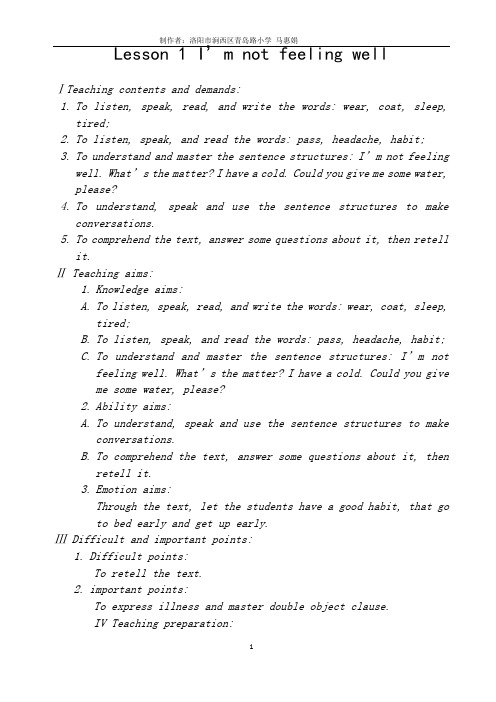
Lesson 1 I’m not feeling wellⅠTeaching contents and demands:1.To listen, speak, read, and write the words: wear, coat, sleep,tired;2.To listen, speak, and read the words: pass, headache, habit;3.To understand and master the sentence structures: I’m not fee lingwell. What’s the matter? I have a cold. Could you give me some water, please?4.To understand, speak and use the sentence structures to makeconversations.5.To comprehend the text, answer some questions about it, then retellit.Ⅱ Teaching aims:1.Knowledge aims:A.To listen, speak, read, and write the words: wear, coat, sleep,tired;B.To listen, speak, and read the words: pass, headache, habit;C.To understand and master the sentence structures: I’m notfeeling well. What’s the matter? I have a cold. Could you giveme some water, please?2.Ability aims:A.To understand, speak and use the sentence structures to makeconversations.B.To comprehend the text, answer some questions about it, thenretell it.3.Emotion aims:Through the text, let the students have a good habit, that goto bed early and get up early.Ⅲ Difficult and important points:1.Difficult points:To retell the text.2.important points:To express illness and master double object clause.IV Teaching preparation:sound recording ( To train the students' ability of listening and speaking)TTP(To express the knowledge tools that can image and offer help to solve the difficult points.)V Teaching arrangement:1st: Let's talk2nd: Let's learn, A game& Ask and answer3rd: Listen and number & Listen and say4th: ReadVI Teaching procedures:a1stStep1: Revision:1. To review the words in last term(January, February, March...cloudy, windy, sunny...fourth, fifth, twelfth, twenty-3rd)2. Have a free talk:What day is it today?What's the date today?What was the date yesterday?Step2: Presentation:1.To learn the new words:(To remember the words in different ways, and the students can give their advice)wear /weə/ (w+ ear/iə/) coat(goat,boat, road, the students can summary oa/əu/) pass(class, glass...)2.To learn the dialogue:A.(CAI)Q: 1.Where is Tom?2.Does he have a cold?3.What does he want?( The dialogue divide into two sections to produce difficult.)4.Does Tom want to see a doctor?5.Is it warm outside?6.What does Tom want this time?B. listen to the sound recording and answer the questions.C. Read the dialogue after the recording.D. Double object clauses: Could you give me some water, please?Could you pass me my coat, please?(pay attention to use the object case)Step3: Practice:1. Read the dialougue;2.(CAI/Flip charts)To offer key words, pictures, and sound recording, let the students to read.3.According to the informations, let the students to retell the text.Step4: Consolidation and extension:1. Act the dialogue.2.Tell me your feeling if you are ill.Step5: Homework:Act the dialouge in pairs or recite it.Step6: Blackboard-writing:Lesson1 I'm not feeling wellwear coat passCould you give me some water, please?Could you pass me my coat, please? Step 7:Refection:2ndStep1:Warm-up:Free talk:T: I'm not feeling well.Ss: What's the matter.T: I have a cold. Could you give me a hot water?...Step 2: Revision:Choose some students to recite the dialogue or act it; To review the object cases.(practice: nominative case <--->object case)( preposition/verb + object case )Step 3: Presentation:1.To find the words about illness.cold,cough, fever, headache, toothache(read and speak)(-ache)2.To master the phrases:have a cough/ have a fever/ have a cold/ have a headache/ have a toothache3.To learn the double object clause, and pay attention the object cases.---- I'm not feeling well.--- What's the matter?---I have a cold. Could you give me some water,please?...Step4: Prctice:1. A game:I have a fever. Could you give me some water? She has a fever. Give her some water.2.Ask and answer:To use the sentence structures to make conversations.Extension: have a stomachache/ have a sore throat (Give actions, then let the students guess )Step5: Homework:1. To write a short conversation about illness.2. Do the Exercise Book.Step6: Blackboard-writing:Lesson 1 (Let's learn)have a fever/cold/ headache(organ+ache)... Step 7: Reflection:Step1: Review and check:1.Show your homework, read it or act.2.Review the words: cold, cough, fever, headache, toothache... (read---act---spell)3.(PPT)To offer some pictures about illnesses, let the students express it. eg:--- I'm not feeling well.--- What's the matter.---I have a cold. Could you give me a hot water?... Step 2:To learn “Listen and say”1. Listen to the sound recording twice;2. Read after it;3. Translate (plenty of: many/ much/ a lot of/ lots of);4. Have a dialogue.Step 3: Practice:To learn “Listen and number”(observe the pictures---listen and number)Step 4: Homework:To finish the Exercise Book.Step 5: Blackboard-writing:Lesson 1have a bad cold/...Could you give/pass me...Step 6: Reflection:Step 1:Presentation:1. Learn the words:(To remember the words in different ways, and the students can give their advice)sleep(sheep), tired(ti+ red/ tried), habit(rabbit)2. Learn the text:A. Listen to the sound recording and perceive the text;B. Listen to the sound recording and understand the pictures;C. Listen, read and translate;D. To underline some difficult sentences and v-ed:--- You look tired.--- Drink some milk before you go to sleep.--- I'm sure you will sleep well and get better soon.--- It's a good habit to go to sleep early and get up early.stay---stayed, become---became, have/has---had, go---went, say---said, ask---askedStep 2: Practice:1. Read the text fluently and answer the questions:A. Did Dan often get up early?B. Why did Dan go to see a doctor?C. When does Dan usually go to bed?D. What's the doctor's advice?2.(PPT/flip charts) To offer key words, pictures, and sound recording, let the students to read.3.According to the informations, let the students to retell the text.Step 3:Summary:How to express your illness? ---I'm not felling well./ I have a...Step 4: Homework:1.Read the text five times or retell it;2.Choose some sentences to recite.Step 5:Blackboard-writing:A good habit--- You look tired.--- Drink some milk before you go to sleep.--- I'm sure you will sleep well and get better soon.--- It's a good habit to go to sleep early and get up early. Step 6: Reflection:。
新科普版小学英语六年级下册Lesson 1教案

Lesson 1 I’m not feeling wellⅠTeaching contents and demands:1.To listen, speak, read, and write the words: wear, coat, sleep,tired;2.To listen, speak, and read the words: pass, headache, habit;3.To understand and master the sentence structures: I’m not fee lingwell. What’s the matter? I have a cold. Could you give me some water, please?4.To understand, speak and use the sentence structures to makeconversations.5.To comprehend the text, answer some questions about it, then retellit.Ⅱ Teaching aims:1.Knowledge aims:A.To listen, speak, read, and write the words: wear, coat, sleep,tired;B.To listen, speak, and read the words: pass, headache, habit;C.To understand and master the sentence structures: I’m notfeeling well. What’s the matter? I have a cold. Could you giveme some water, please?2.Ability aims:A.To understand, speak and use the sentence structures to makeconversations.B.To comprehend the text, answer some questions about it, thenretell it.3.Emotion aims:Through the text, let the students have a good habit, that goto bed early and get up early.Ⅲ Difficult and important points:1.Difficult points:To retell the text.2.important points:To express illness and master double object clause.IV Teaching preparation:sound recording ( To train the students' ability of listening and speaking)TTP(To express the knowledge tools that can image and offer help to solve the difficult points.)V Teaching arrangement:1st: Let's talk2nd: Let's learn, A game& Ask and answer3rd: Listen and number & Listen and say4th: ReadVI Teaching procedures:a1stStep1: Revision:1. To review the words in last term(January, February, March...cloudy, windy, sunny...fourth, fifth, twelfth, twenty-3rd)2. Have a free talk:What day is it today?What's the date today?What was the date yesterday?Step2: Presentation:1.To learn the new words:(To remember the words in different ways, and the students can give their advice)wear /weə/ (w+ ear/iə/) coat(goat,boat, road, the students can summary oa/əu/) pass(class, glass...)2.To learn the dialogue:A.(CAI)Q: 1.Where is Tom?2.Does he have a cold?3.What does he want?( The dialogue divide into two sections to produce difficult.)4.Does Tom want to see a doctor?5.Is it warm outside?6.What does Tom want this time?B. listen to the sound recording and answer the questions.C. Read the dialogue after the recording.D. Double object clauses: Could you give me some water, please?Could you pass me my coat, please?(pay attention to use the object case)Step3: Practice:1. Read the dialougue;2.(CAI/Flip charts)To offer key words, pictures, and sound recording, let the students to read.3.According to the informations, let the students to retell the text.Step4: Consolidation and extension:1. Act the dialogue.2.Tell me your feeling if you are ill.Step5: Homework:Act the dialouge in pairs or recite it.Step6: Blackboard-writing:Lesson1 I'm not feeling wellwear coat passCould you give me some water, please?Could you pass me my coat, please? Step 7:Refection:2ndStep1:Warm-up:Free talk:T: I'm not feeling well.Ss: What's the matter.T: I have a cold. Could you give me a hot water?...Step 2: Revision:Choose some students to recite the dialogue or act it; To review the object cases.(practice: nominative case <--->object case)( preposition/verb + object case )Step 3: Presentation:1.To find the words about illness.cold,cough, fever, headache, toothache(read and speak)(-ache)2.To master the phrases:have a cough/ have a fever/ have a cold/ have a headache/ have a toothache3.To learn the double object clause, and pay attention the object cases.---- I'm not feeling well.--- What's the matter?---I have a cold. Could you give me some water,please?...Step4: Prctice:1. A game:I have a fever. Could you give me some water? She has a fever. Give her some water.2.Ask and answer:To use the sentence structures to make conversations.Extension: have a stomachache/ have a sore throat (Give actions, then let the students guess )Step5: Homework:1. To write a short conversation about illness.2. Do the Exercise Book.Step6: Blackboard-writing:Lesson 1 (Let's learn)have a fever/cold/ headache(organ+ache)... Step 7: Reflection:Step1: Review and check:1.Show your homework, read it or act.2.Review the words: cold, cough, fever, headache, toothache... (read---act---spell)3.(PPT)To offer some pictures about illnesses, let the students express it. eg:--- I'm not feeling well.--- What's the matter.---I have a cold. Could you give me a hot water?... Step 2:To learn “Listen and say”1. Listen to the sound recording twice;2. Read after it;3. Translate (plenty of: many/ much/ a lot of/ lots of);4. Have a dialogue.Step 3: Practice:To learn “Listen and number”(observe the pictures---listen and number)Step 4: Homework:To finish the Exercise Book.Step 5: Blackboard-writing:Lesson 1have a bad cold/...Could you give/pass me...Step 6: Reflection:Step 1:Presentation:1. Learn the words:(To remember the words in different ways, and the students can give their advice)sleep(sheep), tired(ti+ red/ tried), habit(rabbit)2. Learn the text:A. Listen to the sound recording and perceive the text;B. Listen to the sound recording and understand the pictures;C. Listen, read and translate;D. To underline some difficult sentences and v-ed:--- You look tired.--- Drink some milk before you go to sleep.--- I'm sure you will sleep well and get better soon.--- It's a good habit to go to sleep early and get up early.stay---stayed, become---became, have/has---had, go---went, say---said, ask---askedStep 2: Practice:1. Read the text fluently and answer the questions:A. Did Dan often get up early?B. Why did Dan go to see a doctor?C. When does Dan usually go to bed?D. What's the doctor's advice?2.(PPT/flip charts) To offer key words, pictures, and sound recording, let the students to read.3.According to the informations, let the students to retell the text.Step 3:Summary:How to express your illness? ---I'm not felling well./ I have a...Step 4: Homework:1.Read the text five times or retell it;2.Choose some sentences to recite.Step 5:Blackboard-writing:A good habit--- You look tired.--- Drink some milk before you go to sleep.--- I'm sure you will sleep well and get better soon.--- It's a good habit to go to sleep early and get up early. Step 6: Reflection:。
最新科普版英语六年级下册课文及翻译 (直接打印版)
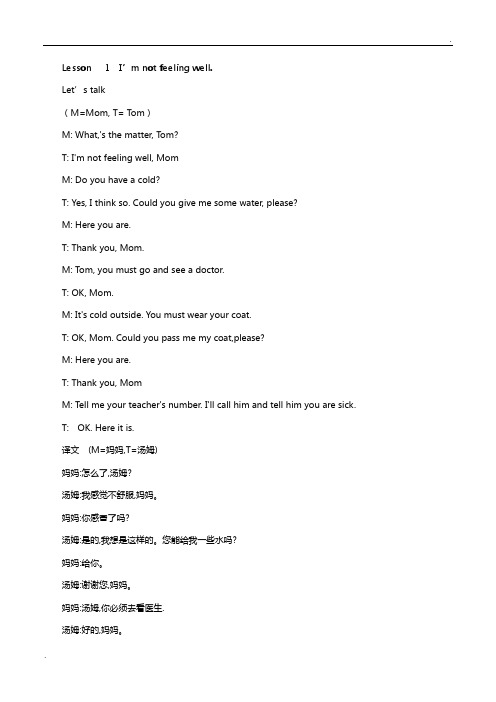
Lesson 1 I’m not feeling well.Let’s talk(M=Mom, T= Tom)M: What,'s the matter, T om?T: I'm not feeling well, MomM: Do you have a cold?T: Yes, I think so. Could you give me some water, please?M: Here you are.T: Thank you, Mom.M: T om, you must go and see a doctor.T: OK, Mom.M: It's cold outside. You must wear your coat.T: OK, Mom. Could you pass me my coat,please?M: Here you are.T: Thank you, MomM: T ell me your teacher's number. I'll call him and tell him you are sick. T: OK. Here it is.译文(M=妈妈,T=汤姆)妈妈:怎么了,汤姆?汤姆:我感觉不舒服,妈妈。
妈妈:你感冒了吗?汤姆:是的,我想是这样的。
您能给我一些水吗?妈妈:给你。
汤姆:谢谢您,妈妈。
妈妈:汤姆,你必须去看医生.汤姆:好的,妈妈。
妈妈:外面很冷。
你必须穿你的外套。
汤姆:好的,妈妈。
您能把我的外套递给我吗?妈妈:给你。
汤姆:谢谢您,妈妈。
妈妈:告诉我你老师的电话号码。
我将给他打电话告诉他你生病了。
汤姆:好的。
电话号码在这儿。
ReadA good habitDan often stayed up late and got up late . At last he became ill. He had a bad headache, and couldn't get to sleep at night. So he went to see a doctor.“Oh, you look tired. What's the matter?" the doctor asked.“I have a bad headache and can't get to sleep at night.”Dan said.“When do you usually go to bed?”“I usually go to bed after 12 o'clock.”“You should go to bed before 10 o'clock. Drink some milk before you go to sleep. I’m sure you will sleep well and get better soon.”From then on, Dan went to bed early and soon he got better.It's a good habit to go to bed early and get up early.译文一个好习惯丹经常熬夜到很晚而且很晚起床。
六年级下册英语Lesson 1 I'm not feeling well Lesson 3 我们要有好习惯 科普版

Staying healthy!
知识讲解
Take a rest from all your hard work. Rest and relaxation are good for your health. Some habits are bad for your health, such as smoking and drinking alcohol.
知识讲解
From then on, Dan went to bed early and soon he got better. It’s a good habit to go to bed early and get up early.
知识讲解
Let’s learn some good habits!
知识讲解
Oh, you look tired. What’s the matter?
I have a bad headache and can’t get to sleep at night.
知识讲解
When do you usually go to bed?
I usually go to bed after 12 o’clock.
Thanks and see you nexually go to bed? 你通常什么时候睡觉? I usually go to bed after 12 o’clock. 我通常12点以后睡觉。 I’m sure you will sleep well and get better soon. 我相信你会睡得很好,很快就会好的。
Staying healthy!
知识讲解
Get a good night’s sleep.
Wash your hands after using the bathroom and before you eat.
六年级英语下册Lesson1《I’mnotfeelingwell》 优秀课件4科普版
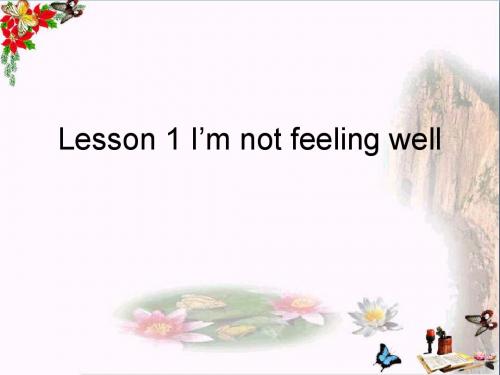
--- I'm not feeling well. --- What's the matter? --- I have a cold. Could you give me some water, please? ---OK.
1.have a fever 发烧 12.see a dentist 看牙医 2.have a cough 咳嗽 13.get an X-ray 拍X 光片 3.have a toothache 牙疼 14.take one’ s temperature 量体温 4.talk too much 说得太多 15.feel very hot 感到很热 5.drink enough water 喝足够的水 6.have a cold 受凉;感冒 7.have a stomachache 胃疼 8.have a sore back 背疼 9.have a sore throat 喉咙痛 10.lie down and rest 躺下来休息 11.hot tea with honey 加蜂蜜的热茶
梦想的力量, 当我充满自信地,朝着梦想 的方向迈进,并且毫不畏惧 地,过着我理想中的生活, 成功,会在不期然间忽然降 临!
1有了坚定的意志,就等于给双 脚添了一对翅膀。 2一个人的价值在于他的才华, 而不在他的衣饰。 3生活就像海洋,只有意志坚强 的人,才能到达彼岸。 4、鸟欲高飞先振翅,人求上进 先读书。
科普版-英语-六下-Lesson 1 I‘m not feeling well
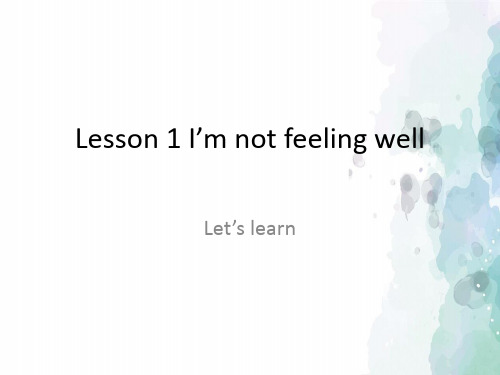
Homework:
1. To write a short conversation about illness. 2. Do the Exercise Book.
--- She’s not feeling well. --- What's the matter? --- She has a toothache. Could you give her some water , please? ---OK.
1st: Listen and read the dialogue
--- They’re not feeling well. --- What's the matter? --- They have a fever. Could you give them some water, please? ---OK.
--- He’s not feeling well. --- What's the matter? --- He has a headache. Could you give him some water, please? ---OK.
1st: matter feeling cold yes water
2nd : Listen and read the dialogue
2nd :
must see a doctor cold outside wear coat pass teacher’s number call him sick
What can she do? She should drink some water.
I have a cold, me
--- I'm not feeling well. --- What's the matter? --- I have a cold. Could you give me some water, please? ---OK.
科普版英语六年级下Lesson 1 I'm not feeling well第一课时
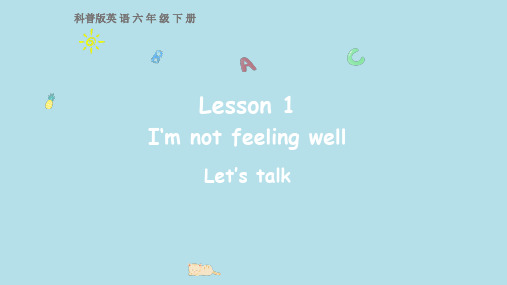
知识点2 give,pass的用法
【教材原文】—Could you give me some water, please? —Could you pass me my coat, please?
句式结构 give sb something pass sb something
主要用法 give sb
2.Does he have a cold? Yes, he does.
3.What does he want? He wants some water.
Let’s talk
请大声朗读课文。
M: Tom, you must go and see a doctor. T: OK, Mom. M: It’s cold outside. You must wear your coat. T: OK, Mom. Could you pass me my coat, please? M: Here you are. T: Thank you, Mom. M: Tell me your teacher’s number. I’ll call him and tell
Read after the tape.
(M = Mom, T = Tom) M: What’s the matter, Tom? T: I’m not feeling well, Mom. M: Do you have a cold? T: Yes, I think so. Could you give
[pɑːs]
Could you pass me my coat, please?
Presentation 请大声朗读课文。
Let’s talk
(M = Mom, T = Tom)
六年级下册英语课件-lesson-1《I’m not feeling well》|科普版
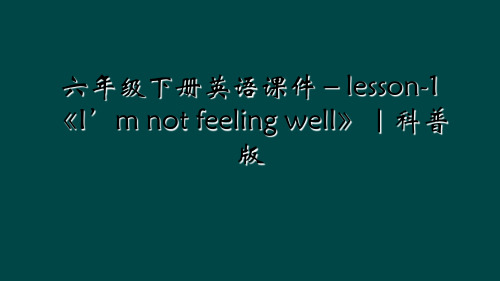
You can watch the football game on TV.
Yes,my father will be with me.
That's great!
Read a bad habit 一个坏习惯
2. we us our
ours
3. he him his
his
பைடு நூலகம்
4. she her her
hers
5. I
me my
mine
1. have a fever 2. have a cough 3. have a headache 4. have a toothache 5. have a cold
I'm not feeling well. What's the matter?
soon ➢ From then on,Dan went to bed early and
go to bed指“去睡觉”, go to sleep意思是“入睡”、“睡着”, 如:I went to bed at ten,
but I didn't go to sleep until midnight. 十点我就上床了,可直到午夜才睡着
•No,thanks. I have a bad cold.
例:得lo了ok!重it感is a冒bird.
•You should drink plenty of water and and stay in bed. I'm in bed now.
你例se:s可应eh是i以oc该u强a翻ldn调和是译se看一为大e的个应a量结情该bi果r的态、d.,动将水强词会并调,的且与看动待得词在见原看床形不连上见用。。,
六年级下册英语教案Lesson1%09I am not feeling well. 科普版
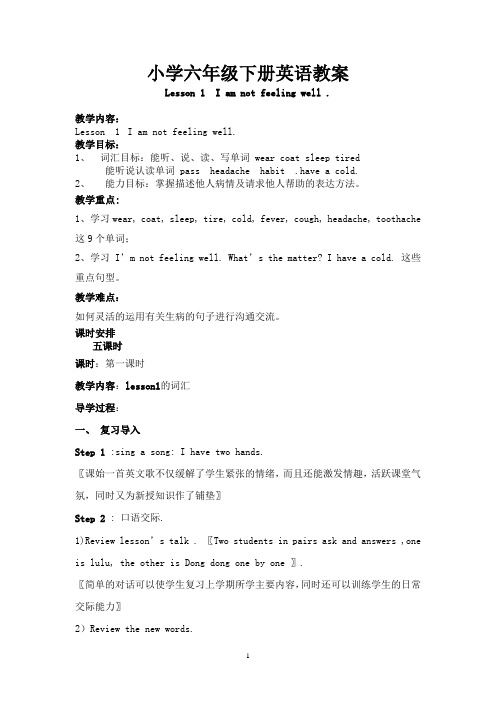
小学六年级下册英语教案Lesson 1 I am not feeling well .教学内容:Lesson 1 I am not feeling well.教学目标:1、词汇目标:能听、说、读、写单词 wear coat sleep tired能听说认读单词 pass headache habit .have a cold.2、能力目标:掌握描述他人病情及请求他人帮助的表达方法。
教学重点:1、学习wear, coat, sleep, tire, cold, fever, cough, headache, toothache 这9个单词;2、学习 I’m not feeling well. What’s the matter? I have a cold. 这些重点句型。
教学难点:如何灵活的运用有关生病的句子进行沟通交流。
课时安排五课时课时:第一课时教学内容:lesson1的词汇导学过程:一、复习导入Step 1 :sing a song: I have two hands.〖课始一首英文歌不仅缓解了学生紧张的情绪,而且还能激发情趣,活跃课堂气氛,同时又为新授知识作了铺垫〗Step 2 : 口语交际.1)Review lesson’s talk . 〖Two students in pairs ask and answers ,one is lulu, the other is Dong dong one by one 〗.〖简单的对话可以使学生复习上学期所学主要内容,同时还可以训练学生的日常交际能力〗2)Review the new words.T: Read the Chinese meaning .S: students write the English words.〖听写可以调动全体学生的积极性,同时也可以检验全体学生对单词的掌握情况〗二、出示教学目标1、词汇目标:能听、说、读、写单词 wear coat sleep tired能听说认读单词 pass headache habit .have a cold.3、能力目标:掌握描述他人病情及请求他人帮助的表达方法。
科普版小学英语 六年级下册课文翻译

Lesson1I’m not feeling well第一课我不舒服Let’s talk(第一段)妈妈:汤姆,怎么了?汤姆:妈妈,我不舒服。
妈妈:你感冒了吗?汤姆:是的,我觉得是。
你能给我些水吗?妈妈:给你。
汤姆:谢谢你,妈妈。
(第二段)妈妈:汤姆,你必须要去看医生。
汤姆:好的,妈妈。
妈妈:外面天气冷,你必须穿上你的外套。
汤姆:好的,妈妈。
你可以把我的外套递给我吗?妈妈:给你。
汤姆:谢谢你,妈妈。
妈妈:把你们老师的电话号码告诉我。
我要给他打电话,告诉他你生病了。
汤姆:好的,给你。
Let’s learn(左上角文本框中)-我觉得不舒服。
-你怎么了?-我感冒了。
你能给我些水吗?-好的。
Ask and answer-怎么了?-我发烧了,你能给我些水吗?-给你。
-谢谢。
Listen and say萨姆:嗨,汤姆。
我是萨姆。
今天下午有一场足球赛。
你想看吗?汤姆:不了,谢谢。
我得了重感冒。
萨姆:哦。
你应该多喝水多休息。
汤姆:是的,我现在就躺在床上呢。
萨姆:你可以在电视上看那场足球赛。
汤姆:是的,我爸爸会陪着我的。
萨姆:太棒了!Read一个好习惯P6丹经常晚睡晚起。
终于有一天他病倒了。
他头痛得厉害,在夜晚无法入睡。
所以他去看医生。
“哦,你看起来很疲惫。
怎么了?”医生问道。
“我头痛得厉害,而且夜晚无法入睡,”丹说。
P7“你通常什么时候睡觉?““我通常12点后睡觉。
““你应该在10点之前睡觉。
睡前喝些牛奶。
我确定你会睡得好也会很快好起来。
“从那时起,丹就早睡,并且身体很快好了起来。
早睡早起是个好习惯。
Lesson2Did you play basketball yesterday?第二课你昨天打篮球了吗?Let’s talk露露:你好,汤姆!通常你周日下午都做什么?汤姆:我经常打篮球。
露露:你昨天打篮球了吗?汤姆:不,我没有。
我去看望了一个朋友。
露露:你过得开心吗?汤姆:是的,很开心。
我的朋友喜欢摄影。
他给我看了许多照片。
- 1、下载文档前请自行甄别文档内容的完整性,平台不提供额外的编辑、内容补充、找答案等附加服务。
- 2、"仅部分预览"的文档,不可在线预览部分如存在完整性等问题,可反馈申请退款(可完整预览的文档不适用该条件!)。
- 3、如文档侵犯您的权益,请联系客服反馈,我们会尽快为您处理(人工客服工作时间:9:00-18:30)。
六年级下册Lesson 1 I’m not feeling well.
知识点精讲:
一、核心词汇短语
headache 头疼n. toothache 牙疼n.
wear 穿v. pass 穿过,通过,递给v.
sleep 睡觉v. stay up 熬夜v.
have a cold 感冒v. go to bed 上床睡觉v.
see a doctor 看医生drink some water 喝点水
have a fever 发烧have a cough 咳嗽
plenty of 很多stay in bed 呆在床上
二、核心必备句型
Could you +动词原形……?
You must +动词原形.
tell sb. sth.= tell sth. to sb.
pass sb. sth.=pass sth. to sb.
There be(看主语)+…….
It is a good habit to do sth. 做……是好习惯
sleep well 睡得好
get better 变得更好
三、人称代词----宾格
单数复数
第一人称me us
第二人称you you
第三人称him/her/it them
典型例题讲解及思维拓展
例1----Could you pass _____my coat?
----Ok, here you are!
A. us
B. me
C. you
D. his
分析:人称代词宾格考察。
pass是动词,后面跟人称代词的宾格形式。
所以A,B,C符合要求,
根据句子的意思进行判断,B是正确答案。
例2. ---It is a good habit ______to bed early and get up early.
A.go
B. to go
C. going
分析:It is a good habit to do sth. 固定用法。
B。
拓展变式练习
一、根据要求完成下列各词
1.get(过去式)____________
2.become(过去式)_________
3.stay up(翻译)__________
4.my(宾格)__________
5.have a cough(翻译)__________
二、翻译句子
1.你怎么了?
2.早睡早起是一个好习惯。
3.能把我的外套递给我么?
4.我昨天得了重感冒。
5.我肯定你将会睡得好并且很快好起来。
三、改错,圈出错误并改正。
1.I am fell well.
2.Are you have a cold?
3.He must wearing his coat.
4.Tell his your teacher’s number.
5.Could you give me any water?
巩固练习
一、单选
1.You should _____plenty of water and stay ___bed.
A.drink; on
B. to drink; in
C. drinking; in
2.You can watch football game ___TV.
A.in
B. on
C. for
3.My father will ____with me.
A. is
B.are
C.be
4. He ____a bad headache and ____get to sleep at night.
A. have;can
B. has;can’t
C. had;couldn’t
5 Drink some milk_____you go to sleep.
A. after
B. before
C. with
思维能力提升
文章翻译
1.经常熬夜很晚,并且起的也很晚。
最后他生病了。
他得了严重的头疼,并且夜里睡不着,因此他去看医生。
2.你应该在十点之前睡觉。
睡觉之前喝点牛奶。
我确定你会睡得很好,并且很快好起来。
3.我将给你老师打电话告诉他你生病了。
课后反思小结。
